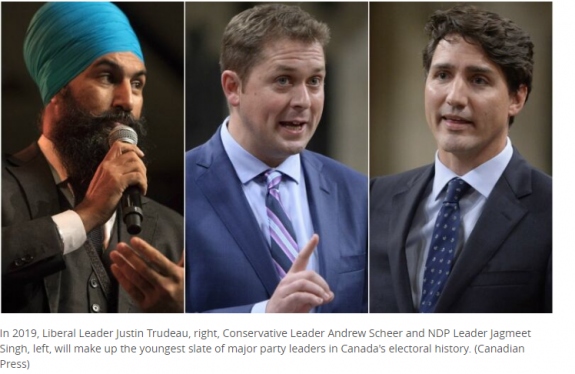Election 2019 in Canada: A Change Agenda Protected by Minority Government?

By Denis Bright
Canadians voted to continue a reformist agenda with a minority Liberal Government that can still draw upon future negotiated support from both the Bloc Quebecois (BQ) and the New Democratic Party (NPD). The Liberal vote held up well in Ontario and Eastern Atlantic provinces outside Quebec itself.
The urban population centres of Ontario delivered almost half of Liberal Party members (79) in the House of Commons where the Conservatives had a net gain of just three seats. Adjacent Quebec still delivered another 35 electoral districts to the Liberals despite a net gain of 22 seats by BQ. The Atlantic Provinces of Newfoundland, Nova Scotia and New Brunswick continued their strong mandate for Liberal members.
The net loss of 29 electoral districts across Canada deprived the Liberals of their majority in the House of Commons from the landslide results of 2015. The Conservatives ended ahead of the overall national vote (34.4 per cent) compared with 33.1 per cent for the Liberals.
The Liberal Party’s primary vote was down by 6.4 per cent with a net loss of 29 seats. The more detailed break-down of voting patterns is readily available from the web sites of Canada Votes (CBC) and The Star (Toronto):
Justin Trudeau’s popular appeal was tarnished throughout 2019 by several administrative irregularities. The first was from the SNC-Lavalin Affair in February 2019 (BBC News 28 February 2019):
Canadian Prime Minister Justin Trudeau has denied wrongdoing after he tried to shield one of the country’s biggest firms from a corruption trial.
Mr Trudeau said any lobbying by him or his inner circle for engineering giant SNC-Lavalin was done to protect jobs.
In explosive testimony, ex-Justice Minister Jody Wilson-Raybould said she faced “sustained” pressure to abandon prosecution of the Quebec-based firm.
Another outrage for environmentalists was the purchase of the Trans Mountain pipeline (France 24 20 October 2019):
The Liberal government bought the Trans Mountain pipeline, which links Alberta to British Columbia, from the American energy giant Kinder Morgan for Can$4.5 billion ($2.7 billion, 2.4 billion euros).
The goal was to speed up the export of oil from Alberta to new foreign markets. In exchange, the Canadian government promised to invest the profits in green technology.
Many Canadian environmentalists viewed Trudeau’s move as a betrayal. For activists, Trudeau, who was a symbol of hope when he took office in 2015, is no longer a change agent but the man who didn’t do enough for the environment.
Faced with the demands of delivering military commitments to NATO, urban infrastructure and the services demands by large urban populations in the Great Lakes Lowlands, Canada is rarely able to deliver a balanced budget as a percentage of GDP. Only the energy rich and grain producing prairie provinces warmed to the campaign from Opposition Leader Andrew Scheer for an end to Canada’s version of a carbon tax in a more pro-business society.
Canada’s Tolerance of Budget Deficits as a Percentage of GDP
Canada’s government debt to GDP level is running at about twice the Australian level. Higher Canadian levels of government intervention in service delivery have kept the unemployment rate in the 5.4-5.8 range over the past twelve months. Voters east of the prairie provinces did not want to risk a return to the economic austerity of the previous conservative governments in the post-GFC era.
The conventional and highly polarising campaign in Canada largely by-passed the problems associated with a shortage of private sector capital investment.
Canada’s pension funds at national and provincial levels have been a success story.
Having survived into a second term Justin Trudeau can look to support from BQ and NPD for such alternative investment agendas in a middle-sized social market economy with almost half the economic output of France or Britain.
The strains of delivering economic growth and employment show up in middle-sized economies like Canada and Australia in quarterly economic indicators during 2019 without a more diversified financial sector. Trading Economics offers the quarterly GDP percentages for 2019 in context:
Canada
Australia
From the minority government mix just delivered in Canada, there is a slight possibility that policy initiatives might address these investment shortfalls without drifting further towards the more corporatised society that would be welcomed by US Republicans south of the 49th parallel where tariffs of 25 per cent were imposed on Canadian steel exports to the US and 10 per cent on aluminium ingots by the Trump Administration in 2018 in protest against Canada’s more interventionist economic model.
Tough negotiations in defence of Canadian jobs of these tariff issues in heavy industrial areas of Southern Ontario minimised the appeal of Andrew Scheer’s appeals to blue-collar voters to vote against a continuation of the carbon tax.
Canada’s change agenda was saved on 21 October 2019 even at the expense of continued majority government.
Like what we do at The AIMN?
You’ll like it even more knowing that your donation will help us to keep up the good fight.
Chuck in a few bucks and see just how far it goes!
Your contribution to help with the running costs of this site will be gratefully accepted.
You can donate through PayPal or credit card via the button below, or donate via bank transfer: BSB: 062500; A/c no: 10495969